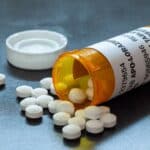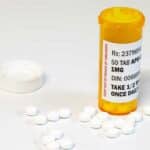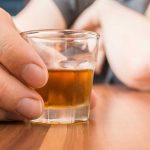Taking Ativan (generic name lorazepam) after drinking alcohol is not recommended by health professionals.
If you need to maintain your Ativan schedule and you had alcohol previously, waiting until alcohol is removed from your system can minimize your health risk. This can take about 8 to 24 hours on average.
If Ativan and alcohol are in your system at the same time, both substances may slow down your central nervous system to dangerous levels. This sedation effect may be stronger compared to either substance taken individually.
Concomitant Ativan and alcohol use can be a sign of a chronic substance use disorder. Patients suffering from this condition may benefit from a professional substance abuse treatment program.
Interactions Between Lorazepam & Alcohol
Lorazepam and alcohol are both central nervous system (CNS) depressants that slow down brain activity. Lorazepam and alcohol are both thought to interact with receptors of the inhibitory neurotransmitter gamma aminobutyric acid, or GABA.
High amounts of GABA can cause a sedative effect that can prevent communication between vital bodily functions. This sedative effect can cause previously safe doses of Ativan and alcohol to become dangerous.
Elimination Time Of Alcohol & Ativan
Taking Ativan after alcohol has left your system can reduce your risk of serious side effects.
On average, it takes approximately one hour to metabolize a standard drink (14 grams of pure alcohol). However, the elimination time of alcohol may be more than eight hours for an average person.
By comparison, Ativan has a long half-life of about 12 hours, and the effects of Ativan can be felt for about 8 hours. Ativan may not completely leave a person’s system between doses, which means that taking alcohol at any point while on Ativan can cause serious side effects.
The metabolism and elimination time of alcohol may vary by person. Abstaining from alcohol while taking Ativan is likely safer than timing your doses of each substance.
Risks Of Mixing Ativan & Alcohol
Immediate side effects of alcohol and Ativan combined may include slowed breathing, impairment, sedation, a slowed heart rate, and sleepiness. These effects, and other serious health risks, may become more severe if a higher amount of alcohol and Ativan was ingested.
Ativan Overdose
The risk of Ativan overdose may significantly increase when it is taken with alcohol, due to the additive effects of both substances. A previously low amount of alcohol and Ativan can become dangerous when they are ingested in a short period of time.
Signs of an Ativan overdose may include:
- drowsiness
- sluggishness
- low blood pressure
- respiratory depression
- severe impairment
- a loss of consciousness
- coma
Overdosing on Ativan and alcohol can be life-threatening, especially if immediate treatment is not administered.
Substance Use Disorder
A substance use disorder is a long-term mental health condition characterized by an inability to stop taking high-risk drugs. Mixing alcohol and Ativan is not recommended by health organizations, and doing so can be a form of both Ativan and alcohol abuse.
Abusing substances increases your risk of a substance use disorder.
A substance use disorder can also increase the chances of an overdose. Victims suffering from alcohol withdrawal or benzodiazepine withdrawal may relapse without warning. They may ingest high doses of either substance with reduced tolerance, which can lead to an overdose.
Concomitant Substance Use Treatment
If you take Ativan and alcohol together despite the health risks, you may find it difficult to quit without professional help. Both substances can be habit-forming, and the withdrawal symptoms that may accompany discontinuation may lead to a dangerous relapse.
Professional treatment programs may utilize behavioral therapy, medication-assisted treatment, dietary supplements, and other methods to help patients reduce their pattern of high-risk use.
To find out if our outpatient substance use treatment program works for you or your loved one, please contact us today.
Sources
Written by
Northeast Addition Editorial Team
©2024 Northeast Addition Center | All Rights Reserved
This page does not provide medical advice.





